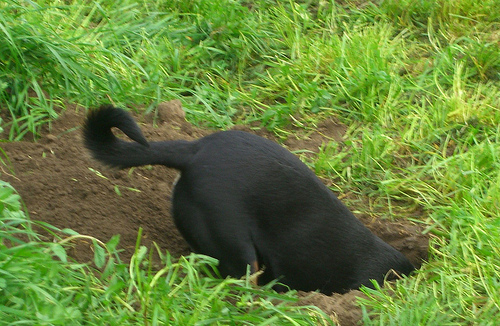 Digging
Digging
What? You Didn’t Want Holes in the Yard?
Your dog has no idea that you didn’t provide him a yard so he could dig holes all over it. You, on the other hand, have beautiful grass or landscaping, and you would prefer to keep it that way. So, let’s take a look at some reasons why dogs dig (and how to curb the behavior).
Reason 1: You May Have One of Those Breeds.
If you have a Terrier, Dachshund, or other breed intended to flush small prey out of holes in the ground, you have a dog that is hardwired to dig.
How to Fix It: Create a dedicated digging area, where you can bury toys or treats for your dog to find. Your dog will soon realize that digging in this area is more rewarding than digging in the rest of your yard. The ASPCA has a great primer on creating a digging zone for your dog. Check it out.
Reason 2: Your Dog May Be Seeking Prey.
Your dog may be actively pursuing insects or small animals living in your yard. Consider this possibility especially if your dog is digging at the roots of shrubs or trees, rather than at the boundaries of the yard.
How to Fix It: Look for signs of a pest/vermin infestation, and then treat your yard appropriately. There are many non-toxic solutions to pest problems.
Reason 3: Your Dog is Bored.
A dog left to his own devices in a backyard will find ways to entertain himself. No playmate? No toys? Lots of energy to burn off? Might as well dig a hole!
How to Fix It: A digging zone, as described above, will help entertain a bored dog. However, human interaction is the best way to alleviate boredom. Take a walk, throw a ball or Frisbee, blow children’s bubbles for your dog to pop, teach your dog a new trick, or play together with your dog’s toys.
Reason 4: Your Dog is Trying to Escape.
Some dogs want to explore, go after a squirrel, or find that neighborhood dog in heat.
How to fix it: You can reinforce the fence line by burying chicken wire one to two feet below ground or by placing large rocks or railroad ties along the fence line. The more flexible fences, like chain link, are easier to climb over or dig under than more sturdy ones. But if you’re putting in a fence, make sure that even your sturdy fence goes all the way to the ground, unlike the ornamental fences used more for show than for containment.
Reason 5: Your Dog is Trying to Be Comfortable.
When it’s hot out, dogs will dig a hole and curl up in it because the ground is cool. They may also dig a den to protect themselves from wind or rain if they’re left outside in the elements.
How to Fix It: If the weather is uncomfortable for you, it’s uncomfortable for your dog. Bring your dog indoors during unpleasant weather and provide a source of shelter, if your dog does spend time outside. In the summer, make sure your dog has drinking water. For outdoor play, run an oscillating sprinkler, or fill a plastic kiddie pool and toss in some balls, toys that float, or even ice cubes. Never leave your dog outside unsupervised for any length of time.
Reason 6: Your Dog Wants Attention.
In your dog’s mind, there is a connection between digging a hole and getting your attention. When your dog digs, you come outside to “talk” to him. Woohoo! Of course, it’s not the best kind of attention, but it’s what he has learned will work.
How to Fix It: If you catch your dog in the act, run him to the designated digging zone and praise him when he digs there. If you seem excited about what you find, your dog will follow your lead. And don’t forget to give your dog attention when he is being good, not just when you see something you don’t like.
Key Points to Remember
- Digging is a behavior that’s natural to dogs.
- Figure out why your dog digs, so you can choose the right solution.
- Some dogs, bred to catch small vermin underground, are hard wired to dig.
- Provide more stimulation with walks, training, and play. A tired dog will sleep rather than dig!
- Punishment won’t stop digging. Yelling, shaking or, even worse, throwing a can of pennies will interrupt the digging, but only temporarily.
- Creating a digging pit can provide a rewarding alternative and a more permanent fix.
- Never leave your dog outside unattended.
Still Need Help?
Our trainers would be glad to help you. Our monthly Welcome Home, Pup! is a Q&A session open to anyone, even if you’ve had your dog for a long time. Come pick the brain of one of our trainers and go home with a few new tricks up your sleeve. Click here for the workshop schedule.
Your Dog’s Friend is a 501-c3 non-profit organization that educates and supports dog parents. We offer behavior and training advice; sponsor FREE workshops on a variety of topics; run positive dog training, behavior-related, and sports classes; refer dog parents to trainers, dog walkers, and other professionals; and send an e-newsletter with articles, resources, and announcements.
This material is not intended to be a substitute for professional help when dealing with dogs with intense or potentially dangerous behavior issues. Consider consulting a positive reinforcement trainer or animal behaviorist for situations that you feel are dangerous or that you don’t feel equipped to handle. A list of recommended trainers and behaviorists can be found on our website, www.yourdogsfriend.org.




